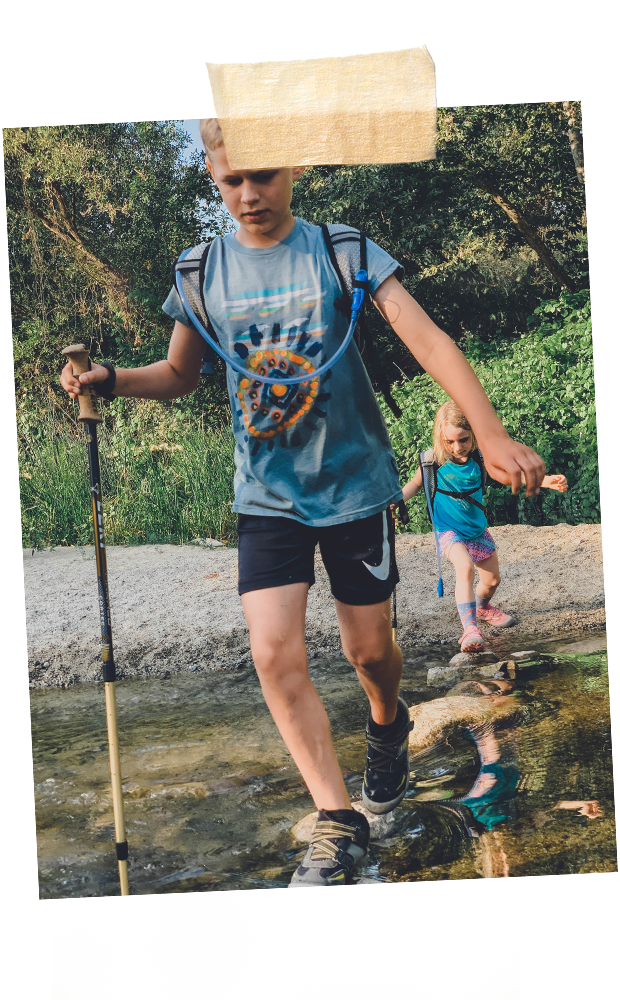Mothering Highly Sensitive Kids is no joke.
Parenting is always rife with challenges… but, when you add highly sensitive kids AND being an empath yourself into the mix, it’s doubly tough. How do we teach them resilience while also honoring their open hearts?
I believe some of the best things we can possibly do for them are actually all about how we navigate the world as adult empaths.
First, we gotta pursue our own dreams.
Unhealthy empaths often forego their own needs, desires, and emotions in order to care for (and about) everyone else. As a mom, I don’t want to pass on these self-sacrificing + codependent patterns to my kids… so it’s up to me to figure out ways to embody and demonstrate “healthy narcissism” through meaningful self-care and personal drive. As empaths, it can be highly uncomfortable to prioritize our own needs. It feels selfish and irresponsible. Have you given up your identity to disappear into the role of “parent”? Have you sacrificed your dreams on the pyre of motherhood?I did too, until my son woke me up.
Not everyone will resonate with this, but I believe it’s VITAL to put my dreams (and my partnership) at the top of my to-do list.

Sure, our kids won’t always like our priorities.
Being a work-from-home entrepreneur means plenty of “I can’t do that right now” conversations with my kids. They don’t love it. And, because I’m an empath, I can feel their frustration in my own body.
But, I stay strong and focused when I need to be. And, because I’m not always at their beck and call, two amazing things have happened:
1) Boredom leads to innovation and creativity.
Because we don’t do much “screen” time with our kids, they get creative. (No judgement though, if screens function as babysitters at your house—sometimes that’s the only viable option to get sh*t done or stay sane.)
Sure, this leads to the occasional broken window, sharpie “nail polish”, or upended couch pillows… But, after a few minutes of whining, our kids can usually be found playing imaginative games, drawing, building blanket forts, or scouring our backyard for fruit to harvest. A little boredom is a good thing.
2) My kids trust me more than ever. – Highly Sensitive Kids
Because I stay true to my word, they know that when I say I’ll be available in 10 minutes, I’ll actually be present at that time. I say what I mean – which shows them that, even if I’m saying No to something they’re asking for, that they can trust me.
This is the gift of NOT people-pleasing or having flimsy boundaries! We build real trust with the people we love.

Next, we need to embrace and express our feelings.
If we can’t admit or share how we’re really feeling, how can we expect our empath kids to honor their sensitivities?
If we think we’re “too much” and suppress our emotions, then we’ll unconsciously tell our kids to repress themselves. Yuck.
As empath parents, we’re invited to step into our full emotional range with our children.
Let your kids see you be sad, angry, joyful, afraid, shy, confident, peaceful and frustrated. – Highly Sensitive Kids
A ‘shame-free’ home that’s not just about love and light honors the complexity that comes with being human. Releasing your kids from the prison of perfectionism by your lived example offers a powerful permission slip for them to get messy, make mistakes, and grow!
Of course, this means we must be humble enough to apologize.
As empaths, we’re often practically apologizing for existing, but when it comes to actually owning up to our mistakes, we get shy. We’d rather be perfect! A genuine apology means admitting that we made a mistake, or goddess-forbid might have caused some harm. This hurts our recovering-people-pleaser hearts. But, it’s such good medicine for our kids to see (and receive) our apologies.
Developing emotional range means that there will be bumps in the road… Especially if you’re not used to expressing uncomfortable feelings like frustration and anger; they might come out a bit sideways at first; which offers LOTS of opportunities to be humble and say, “I’m sorry.”
Follow up any apology by sharing what you’ve learned and how you’ll do better next time.
In our house, we say that a REAL apology is changed behavior. It’s what we tell our kids (highly sensitive kids), so we’d best be showing up like that ourselves!
Lastly, it’s all about connection.
Ultimately, connection is about communication. For empaths and HSPs, a lot of that communication is happening unconsciously, which depletes our nervous system and exhausts us over time. So, the more consciously you connect with your kids, the less unconscious sensory data your NS has to process.Plus, the better you communicate, the more empowered your kids will be to:
Empowerment for them and less exhaustion for you… Yes, please!

If you want to honor and cultivate your highly sensitive kids, honor and cultivate your highly sensitive self.
The more you live into your superpowers, the more your children will see that it’s safe to be open hearted, that there’s strength in vulnerability, that their empathic nature is their superpower, too.


 Lola Elle is a sacred space designer, stylist, spiritual mentor, and wellness retreat leader based in San Diego, California. When she’s not writing, supporting clients, or designing, you’ll find her on her mat or adventuring with her two kids and aviator husband.
Lola Elle is a sacred space designer, stylist, spiritual mentor, and wellness retreat leader based in San Diego, California. When she’s not writing, supporting clients, or designing, you’ll find her on her mat or adventuring with her two kids and aviator husband.
